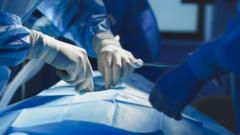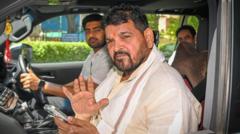In a pioneering operation at Delhi's Aiims hospital, doctors successfully extracted a parasitic twin from a teenager's abdomen, marking a rare medical achievement. The boy, who had faced significant social and mental challenges due to his condition, is now optimistic about a healthier future.
Remarkable Surgery in Delhi: 17-Year-Old Boy Regains Life After Parasitic Twin Removal

Remarkable Surgery in Delhi: 17-Year-Old Boy Regains Life After Parasitic Twin Removal
A life-changing surgery in India successfully removes a rare "parasitic" twin, offering a new lease on life for a 17-year-old boy.
Doctors in Delhi have achieved a groundbreaking medical feat by surgically removing a "parasitic" twin from a 17-year-old boy's abdomen, giving him a new chance at life. Parasitic twins, which are underdeveloped conjoined twins relying entirely on the host for survival, occur in less than one in 100,000 births and present a unique set of surgical challenges.
The teenager, who had an additional set of limbs and pelvis weighing approximately 15kg, underwent a two-hour procedure at the prestigious All India Institute of Medical Sciences (Aiims). Dr. Asuri Krishna, who led the surgical team, noted the complexity of the case, as most documented instances of parasitic twins involve younger patients. With only about 40 to 50 cases known globally, the medical team relied heavily on their experience and intuition when navigating this unusual situation.
Diagnosing the connection between the host and parasitic twin required extensive imaging, revealing that the parasitic appendage was linked to the teen's breastbone and received blood from a thoracic artery. No significant connections to vital organs like the liver or kidneys were discovered, but the surgeons identified a significant cyst in the patient's abdomen.
The surgical approach involved two stages: first, detaching the parasitic twin followed by removing the cystic mass without harming surrounding organs. A multi-disciplinary team, including radiologists and plastic surgeons, successfully performed the intricate procedure, which lasted two-and-a-half hours.
During the surgery, a significant drop in the teenager's blood pressure occurred due to the high volume of blood supply directed toward the parasitic twin. Fortunately, the surgical team was prepared for this eventuality and quickly stabilized him. Just four days after the surgery, the boy was discharged in good health, free from complications.
Before the surgery, the boy faced severe social stigma, leading to emotional distress and isolation. He revealed to local media that he had to drop out of school and felt limited in his daily activities. However, post-surgery, he expressed excitement and hope for the future, stating, "A new world has opened up to me. I hope to study and get a job." His inspiring journey highlights the profound impact of medical innovation and compassion in addressing rare health challenges.





















